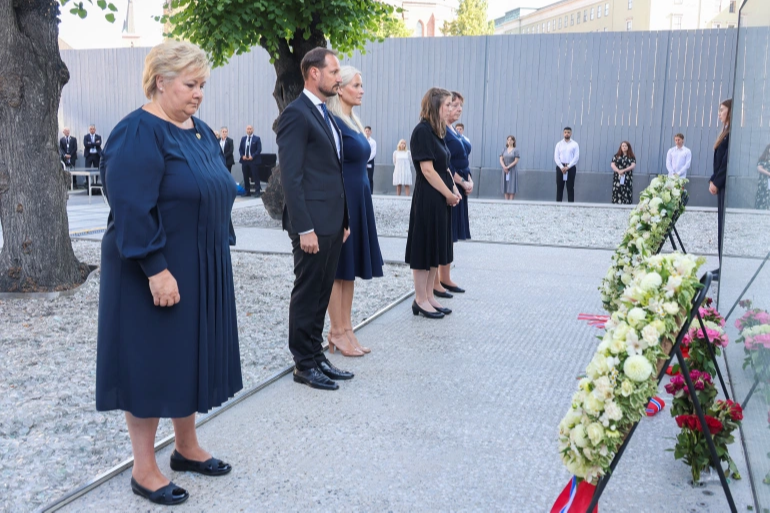
Norway's Prime Minister Erna Solberg, Crown Prince Haakon, Crown Princess Mette-Marit, Workers' Youth League (AUF) leader Astrid Hoem, and a support group leader Lisbeth Kristine Roeyneland attend a memorial service in the Government Quarter 10 years after the Oslo and Utoya island bomb attack, in Oslo, Norway, July 22, 2021 [Geir Olsen/NTB via Reuters]
Oslo, July 22 (RHC)-- Norway has begun commemorations marking 10 years since far-right attacker Anders Behring Breivik killed 77 people in the worst act of violence in the country since World War II.
On July 22, 2011, Breivik detonated a car bomb outside the prime minister’s office in the capital, Oslo, killing eight people. Later the same day, he headed to Utoya island dressed as a police officer and carried out a shooting spree at a Labour Party youth camp, killing 69 people, most of them teenagers.
Thursday’s remembrance events started with a memorial service outside what was once the prime minister’s office – an empty shell since the attack due to disagreements over how to rebuild it.
The service, which was broadcast on television, was attended by Prime Minister Erna Solberg, survivors and relatives of the victims, political leaders and members of Norway’s royal family.
Outside the guarded area, passersby stopped to listen, and some hugged as the names of the victims were read out. “It hurts to think back to that dark day in July, 10 years ago. Today, we mourn together. Today, we remember the 77 that never came home,” Solberg said in a speech delivered at the site.
“The terror of July 22 was an attack on our democracy,” she added, before calling for Norwegians to build a “fortified bulwark against intolerance and hate speech, for empathy and tolerance” and “not let hate stand unopposed.”
Breivik, 42, is serving a 21-year sentence which can be prolonged indefinitely if he is deemed a continued threat to society. He will likely spend the rest of his life behind bars.
The debate over his attacks has shifted over the years. Survivors, many of whom were teenagers at the time of the attack, are now determined to confront the far-right ideology which inspired him. This marks a departure from Norway’s response at the time, when then-Labour Party Prime Minister and current NATO chief Jens Stoltenberg pledged to respond with “more democracy” and “more humanity.”
Astrid Hoem, a leader of the Labour Party youth organisation AUF and survivor of the Utoya massacre, said at Thursday’s memorial event that Norway had “not stopped the hate” a decade on from Breivik’s attacks. “Ten years later, we need to speak the truth … Right-wing extremism is still alive,” she said.
Hoem also urged Norway, home to 5.3 million people, to fully face up to racism in a bid to eradicate it from society and avoid a repeat tragedy. “If we do this now, we might be able to keep our promise of ‘Never again July 22,’” she said.
“The terrorist was one of us. But he does not define who we are – we do.”

